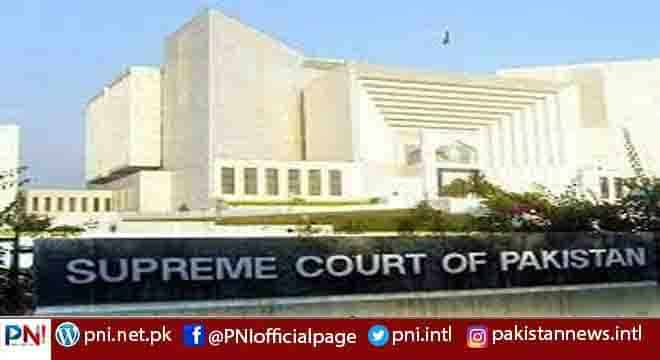Islamabad, May 17, 2022 (Online): The Supreme Court of Pakistan, while announcing verdict in the presidential reference seeking interpretation of Article 63(A), said that the vote of dissident party members will not be counted.
A five-member larger bench, headed by CJP Bandial, and comprising Justice Ijaz-ul-Ahsan, Justice Mazhar Alam Miankhel, Justice Muneeb Akhtar and Justice Jamal Khan Mandokhel, concluded hearing the case.
The decision was opposed by two judges of the five-member larger bench, Justice Mazhar Alam Miankhel and Justice Jamal Khan Mandokhel
Majority of the judges were of the view that lawmakers should not be allowed to vote against party lines, four instances also outlined under Article 63-A.
Former PTI-led government had approached the SC for clarity on Article 63(A) as several PTI lawmakers were likely to vote on the no-trust motion against then Prime Minister Imran Khan, in a violation of the party policy.
In the reference, the government sought the apex court’s opinion on interpretations of Article 63(A) and which one should be adopted and implemented.
Four questions were asked in the Presidential reference
Whether defected members cannot be prevented from vote under Article 63(A) for violating party policy?
Will the vote of defected members can be counted or not?
Whether those who go against the party policy will be disqualified for life-time or not?
What is the period of disqualification under Article 63(A)?
Justice Bandial said the court has conducted a lot of hearings on the case now and added that the AGP should not focus on technical details as things had advanced beyond the issue of maintainability. “This is not a technical matter but a constitutional one but I still agree with the court’s observations,” AGP Ausaf added.
The CJP added that Article 17 talked about the rights of a political party while Article 63-A gave rights to political parties and protected these rights. “In case of violation of Article 63-A, there are two parties – one is the political party itself and another is dissident members,” he added.
The attorney general said Article 63-A outlined the process of proceedings against lawmakers over violation of party policies. “There are multiple pleas on Article 63-A pending in this court and the decision on the reference would affect their proceedings,” he added.
He said a lawmaker is not de-seated automatically as a result of the violation of the said article. “The party member is asked to explain themself through a show-cause notice and if the explanation is not satisfactory then a reference could be sent [to the ECP through speaker],” the top lawyer added.
Justice Jamal Mandokhel asked whether the president had ever raised this issue in his annual speech at parliament. “Did any political party take steps for the interpretation of Article 63-A,” he further asked.
The AGP said the prime minister did not issue any directions to his party members after the defeat of his candidate in the Senate elections. He added Imran had issued a statement before taking a vote of confidence from his party members following the Senate defeat.
Imran had told his members to use their conscience to vote for him, Ausaf added. “Imran had said he would go if his party members refused to vote for him,” the AGP added.
Justice Munib Akhtar said there was a difference between a vote of confidence and a vote of no-confidence. “It is up to the party head if they wanted to issue directives,” Justice Ahsan said and asked if the prime minister could not make changes to his directives. “The prime minister cannot deviate from his directives,” the AGP said.
“Is defection not a sign of malice,” the judge asked. “Is defection not akin to the abuse of trust,” he went to ask. “Can Article 62(1)(f) be applied to defectors after de-seating under Article 63-A,” the judge questioned while referring to the article of the constitution that pertained to ‘truthfulness and righteousness.
The AGP should respond to these questions directly, he added.
Justice Ahsan said there was a grave punishment for dishonesty. The AGP agreed.
He said lawmakers are elected to parliament for five years by the masses and the prime minister becomes the chief executive by the votes of these lawmakers. The lawmakers are answerable to the people, he said, adding that if a prime minister fails to fulfill promises he made to the public then what should happen, the AGP asked.
In such a case, the lawmakers could tender their resignations, the judge added. However, the AGP retorted that the lawmakers could remove the premier for not fulfilling their promises to the people.
The AGP in his written submission stated that the considered scheme of the Constitution, having evolved from the 1962 and 1985 Acts, found expression in the 14th Amendment of 1997, before finally being crystallized in Article 63-A vide 18th Amendment, which restored parliamentary rule by majority vote and not by dictation.
“In my considered opinion, Article 63-A is couched in clear and unambiguous terms; it provides a complete code to ensure a failsafe mechanism; it is closer to an Islamic dispensation; it repeals earlier notions relating to the discarding of votes; and it addresses the consensus raised in the declaration of law in the judgments rendered before its enactment.
No additional penalties are called for, nor is there any element of khiyanat (dishonesty) when members of a single parliamentary party choose to disagree with a direction made in writing (one that has been conveyed to him or her). Each case would have to be examined on its own merits, according to the peculiar facts and circumstances of each case, as and when it reaches this court in its appellate jurisdiction.
“The purpose of Article 63-A, as informed by its previous iterations, the debates within the legislature, and the content of the provision itself, is unmistakable: that a member of parliament may exercise his constitutional right to express himself, to associate with a higher ideal, and to represent the aspirations of his constituents, by voting against the directions of the party head; that the party head retains a considered discretion in terms of adjudging whether the member voted for mala fide reasons or, in the alternative, answered the call of his conscience; that the member may be de-seated, and then is free to exercise his right to re-contest elections and, as held by this apex court in Khawaja Tariq Rahim’s case, make politics clean, and give rise to the emergence of principled leadership.”
Follow the PNI Facebook page for the latest news and updates.








